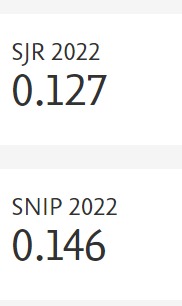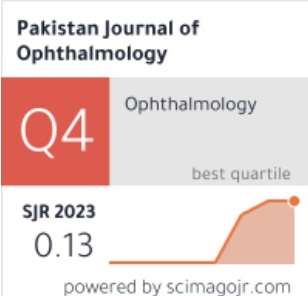Comparison of Axial Ocular Measurements with Contact and Non-contact Biometry
DOI:
https://doi.org/10.36351/pjo.v36i1.922Keywords:
Biometry, Cataract, Axial Length, Anterior Chamber Depth, Central Corneal Thickness.Abstract
Purpose: To compare between non-contact and contact biometry for measurements of central corneal thickness (CCT), anterior chamber depth (ACD), lens thickness (LT) and axial length (AL).
Study Design: Descriptive Cross Sectional Study.
Place and Duration of Study: Mayo Hospital, Lahore from June 2018 to December 2018.
Material and Methods: Eighty-four subjects, (168 non-pathological eyes) visiting the eye outpatients department were recruited by non-probability convenience sampling. Patients with high refractive errors and suffering from any ocular pathology were excluded from the study. CCT, ACD, LT and AL were measured with non-contact Biometer (HAAG Streit) followed by Contact Biometer (Ultrasound) after taking consent from the patient. Data was entered and analyzed by using SPSS-21 and Medcalc software. Normality of quantitative data was checked with Shapiro Wilk test. Independent sample t test was used for parametric variable and Mann Whitney-U test was used for non-parametric data. For the agreement between two techniques Cohen’s Kappa test used and Bland-Altman plot was drawn for graphical presentation. P-value equal or less than 0.05 was taken as significant.
Results: Mean age of 84 subject (female: 45.24% and male: 54.76%) was 53.05 ± 13.56 years. The AL was significantly longer for the non-contact measurement with the difference of 0.53 ± 0.32 mm (p < 0.001). Contact pachymetry was significantly higher with the difference of 8.67 ± 20.83 µm (p = 0.046). ACD was significantly deeper for non-contact measurements with the difference of 0.51 ± 0.32 mm (p < 0.001). Contact ultrasound A-scan measured LT significantly thicker with the difference of 0.59 ± 0.56 mm (p < 0.001).
Conclusion: There is significant difference of axial ocular measurements (CCT, ACD, LT and AL) between contact (ultrasound A-scan) and non-contact (HAAG Streit) biometry (p < 0.05).






